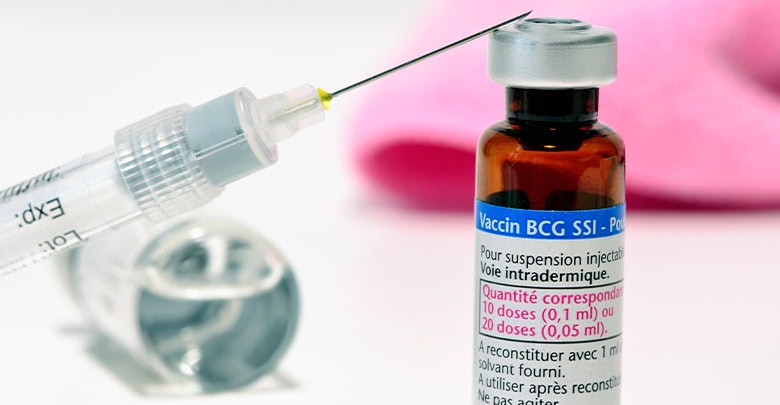Possible T1D Treatment Shows Promise to Reduce COVID-19 Complications
BCG vaccine with high promise for T1D immune systems being tested on high-risk healthcare workers to reduce COVID-19 complications

I spoke with Dr. Denise Faustman about her upcoming trial to test the effectiveness of the BCG vaccine to protect high-risk healthcare workers from COVID-19 complications

Last year we had the opportunity to talk with Dr. Faustman, an Associate Professor of Medicine at Harvard and the Director of the Immunobiology Laboratory at Massachusetts General Hospital. At the time, Dr. Faustman was studying the effects of the BCG vaccine, a century-old tuberculosis vaccine, as a cure for type 1 diabetes. (You can read more about that exciting research here.)
While her research into T1D is still very much active, the events of 2020 have Dr. Faustman working overtime as she prepares to launch yet another BCG vaccine trial to test this age-old remedy as a preventative treatment against the progression of the coronavirus disease.
I recently had a chance to catch up with Dr. Faustman to find out what it is about this unique vaccine that makes it so versatile and what potential application it has in battling the global COVID-19 pandemic that has already affected so many lives.
How Vaccine Protects Against Infections and Diabetes?
Before we can understand how a vaccine can protect against such a wide array of diseases, we first have to look at what makes the BCG vaccine so unique.
Unlike most directed vaccines we use today, including many of those that are being developed right now as a possible vaccine against COVID-19, the BCG vaccine does not utilize a dead or weakened version of the antigen that causes TB. Instead, it utilizes a weakened strain of bovine bacilli, an ancient organism that humans have coevolved with for millions of years.
While most vaccines rely on the body’s adaptive immunity, or the immune system’s ability to respond to a specific infection based on previous exposure, the BCG vaccine affects your body’s innate immunity or the first line of immune defense that prevents the spread and movement of any foreign pathogens throughout the body.
As Dr. Faustman puts it, “It’s believed that what BCG does is automatically boost your innate immune system so that now when you see an organism you don’t have antibodies to, that you don’t have immunity to, you can have a better cytokine response and a better way to fight that infection at a faster rate because of this chronic synergy you have with the BCG organism. So it’s kind of a way to make a super immune system; to dress up your immune system to make it better.”
We have seen the effects of BCG’s super-immune-boosting powers many times before. Dr. Faustman says there are at least three human trials that have shown that if you get the BCG vaccine you are less likely to get respiratory viral infections. Even the incidents of infectious diseases like malaria and yellow fever decrease when the BCG vaccine is given, according to data from double-blind placebo-controlled clinical trials.
But the power of this amazing vaccine doesn’t stop at infections. Current trials, including Dr. Faustman’s own, have shown that BCG has the power to rewire the immune system to treat autoimmune diseases like type 1 diabetes and multiple sclerosis.
Promising Data on the BCG Vaccine and COVID-19
It is this history as an effective treatment for so many diseases that have had many scientists looking to the BCG vaccine as a potential preventative treatment for COVID-19 since the very beginning of the coronavirus outbreak.
Dr. Faustman says that in the last two months there have been multiple papers published looking at the differences in COVID-19 mortality rates between countries like the US, Italy, and Spain that do not have national BCG vaccination programs and countries like China, South Korea, Russia, and Japan who do.
Each of these epidemiology studies shows the same trend: A marked survival benefit in countries who routinely use the BCG vaccine.
While this does not prove that BCG will reduce the mortality rate or severity of COVID-19, these studies do show a strong correlation between the two, which is part of what is driving the current wave of human clinical trials using this vaccine.
Starting Human Clinical Trials for BCG
Currently, there are active trials in both Europe and Australia testing the efficacy of the BCG vaccine against COVID-19. Dr. Faustman’s human clinical trial would be the first of its kind in the United States. She hopes to begin enrolling participants within a month.
Due to the high prevalence of coronavirus cases within Boston, the city is the perfect location for such a trial. In order to reduce the time needed to see results, this trial will enroll high-risk healthcare workers who are more likely to be exposed to the virus within a relatively short period. Similar to the trials in other countries, Dr. Faustman hopes to enroll between 2,000 and 4,000 people.
Half of these participants will receive the BCG vaccine and half will receive a placebo. The hope is, that within the year, enough of these participants will be exposed to the virus that the researchers will be able to draw conclusions about the effectiveness of BCG.
Given the effect the vaccine has on other respiratory illnesses, the assumption is not that BCG will prevent infection altogether, but that it will greatly reduce the severity of symptoms or eliminate symptoms altogether while also reducing the mortality rate of the disease.
Results from Dr. Faustman’s study along with the current trials underway and the ten or so additional trials set to begin around the world in the coming months should provide more than enough data to help governments and healthcare organizations determine if BCG would be a useful tool in the battle against coronavirus.
Potential for Widespread Large-Scale BCG Treatment
At the very least, Dr. Faustman hopes that the BCG vaccine may be a helpful preventative measure to be utilized by high-risk groups such as healthcare workers and the elderly.
But given the potential for some low-risk patients to develop severe complications from coronavirus as well as the well-documented safety and the extraordinarily low cost of producing this particular vaccine, it may prove a useful measure for all.
Dr. Faustman explained that right now there are a number of biotech drugs being tested for use in severely ill patients as well as many companies pursuing a true vaccine for COVID-19. But, in terms of what people can do to protect themselves today, there are masks and social distancing, but that’s about it.
The BCG vaccine has the potential to fill that gap.
Wide-Ranging Benefits of the BCG Vaccine
In addition to the obvious benefits the BCG vaccine could have on fighting COVID-19, there are many other reasons to hope that these trials drive a large-scale BCG vaccination effort.
For one, getting large companies interested in producing this vaccine again has the potential to increase the supply and quality of the vaccine relied upon to treat vulnerable children in less developed nations around the world.
In addition, many studies have shown that inoculation with BCG actually has the power to make more effective the other vaccinations patients receive. Not only could this have a huge impact on the number of flu cases each year, but it may be the missing piece in creating a COVID-19 vaccine that actually works.
And, of course, for so many type 1 diabetics in the world, the BCG vaccine has the potential to change their lives in a profound way.
I asked if Dr. Faustman believed getting the BCG vaccine as a preventative for COVID-19 would have a positive impact on a diabetic’s blood sugars.
“Oh yeah,” she said, “we are still very optimistic about type 1 diabetics [and the BCG vaccine]. We fully expect to see a disproportionate number of type 1 diabetic nurses signing up for our Boston COVID trial.”
Previous research has shown that the blood-sugar-lowering effects of BCG take around two to three years to have a full clinical impact. Meanwhile, the effect of BCG on the body’s ability to fight off respiratory viruses happens much faster. Researchers expect trial participants to show increased resistance to severe COVID-19 symptoms within a couple of weeks of inoculation.
This fact combined with the high incidence of coronavirus infection in the COVID-19 trial participants means that results from these more recent BCG studies are likely to be released relatively quickly.
Meaning, that while we may have to wait another two years to see the results of Dr. Faustman’s BCG-diabetes study, access to her potential diabetes treatment could be just a short COVID-19 trial away.